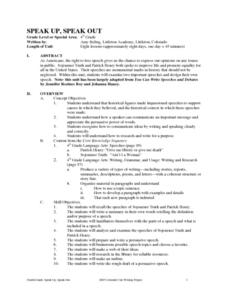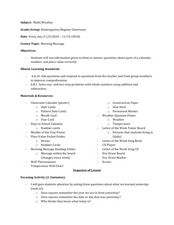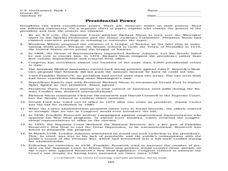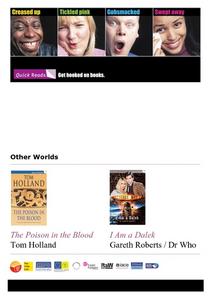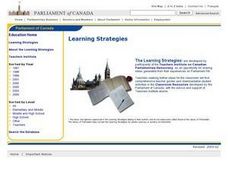Curated OER
Speak Up, Speak Out
Fourth graders examine, compare, and summarize the speeches of Sojourner Truth and Patrick Henry. They review the parts of a good speech and design and give their own speech that expresses an opinion and persuades the listener..
Curated OER
CHICKEN LICKEN
Second graders examine the cover of the book, CHICKEN LICKEN and make predictions about what will happen in the story. They read the book understanding that is a cautionary tale. They read the story again focusing on the repeated refrains.
Curated OER
Universal Studios' Roller Coasters
Students read an article and review a type of graph or other graphic representation. They write a response to a ""Task"" that may be a letter, a report, or a speech to an interested group. In the written response they must refer to both...
Curated OER
The Holocaust's Legacy
Students investigate contemporary hate groups and then participate in a debate on tolerating their existence of the Holocaust. They work in groups to conduct research. Students use print and Web resources to identify one or more...
Curated OER
Emotion or Reason?
Students use persuasive devices to construct oral or written arguments. In this arguments lesson, students discuss the types of persuasive devices used in arguments and form groups to select a topic to research. Students create a...
Curated OER
Author Study - Mo Willems
Students listen to books written by Mo Willems each day and discuss the story elements of each. In this reading strategies instructional activity, students decide after reading through the whole series of books, what their...
Curated OER
A Never-Before-Seen Creature
Students construct a never-before-seen creature in part of an analysis of societal injustices and discrimination. In this societal issues instructional activity, students create a creature called a Man-Droid as a study about the...
Curated OER
Imagery
Students read the poem The Worker by Richard W. Thomas as an example of the effective use of imagery. Then they complete a 5-senses chart describing some part of nature, e.g. sea, clouds, etc. Then they write their own poem using the...
Curated OER
The Wyandotte Constitutional Convention: The Issue of Suffrage
Seventh graders discover details about the Wyandotte Constitutional Convention. In this Kansas history lesson, 7th graders tackle civil rights concerns as they draft persuasive speeches to secure the rights of young voters in the state.
Curated OER
What Really Happened?
Sixth graders recreate scenes from the theories about the disappearance of Amelia Earhart. In this history and theatre activity, 6th graders review the story of Earhart using a flip chart. Students work on one act plays to depict one of...
Curated OER
Morning Message
Pupils point to words in the morning message as it is read, then illustrate a printed copy of the message. Each page is added to a book of collected morning messages.
Curated OER
Westward Expansion: Chief Joseph's Words Of Surrender
Students explore westward expansion in the United States as it relates to Native Americans and the novel Holes. Students read a passage from Holes and discuss how westward expansion affected the Native Americans. Students compare and...
Curated OER
Checks on Presidential Power
Students examine presidential powers. In this checks and balances lesson, students identify the constitutional and informal restraints of the president and consider the reasons for the limitations.
Curated OER
Mighty Metaphors
Fourth graders explore metaphors and then complete a worksheet on which they write metaphors. They may illustrate the metaphors.
Curated OER
The Great Gatsby
Eleventh graders investigate the concept of the American Dream. They use the novel "The Great Gatsby" as an example from literature. Students brainstorm in order to define the American Dream.
Curated OER
Budgeting for Peace
Students explore world leader's quests for peace. In this world leader research lesson, students read a speech by Archbishop Desmond Tutu and view budget figures for the United States. Students work in groups to create an alternate...
Curated OER
We Are the Government
Students read primary documents to find the motivations of the founding fathers of the United States. In this primary documents instructional activity, students discuss the meaning of the Preamble to the Constitution, read parts of the...
Curated OER
Passive Voice Verbs Worksheet
In this passive voice verb worksheet, they rewrite 5 sentence using a passive verbs, rewrite 4 sentences to maintain meaning, change 10 sentences to the passive form, and change 10 passive sentences into the active form.
Curated OER
Acting Like a Bunch of Animals: Fables and Human
The video "The Tales of Aesop" traces for viewers the history of fables and identifies their characteristics. The class then goes to the web site "The Fisherman and the Little Fish" where they examine the classic and a modern version of...
Curated OER
Drama: A Streetcar Named Desire
Twelfth graders examine all the descriptions of costumes, props, movement, lighting and music in the stage directions of A Streetcar Named Desire. They begin to imagine this drama as a production, not simply a script. Students perform...
Curated OER
Other Worlds
Students explore the variety of 'other worlds' in fiction and their uses in reflecting our own. They explore the role of myth and
legend as the basis for modern story telling. Book extracts are provide for classroom use.
Curated OER
Poetry Sings
Students examine examples of literary terms in poetry. Then they choose two songs, write out the lyrics, and decipher what they think the artist is trying to say. Each student presents their song to the class and they cite examples of...
Curated OER
It's Debatable!
Students examine the basic elements and vocabulary of debating. They research an issue and write a letter to the editor of the local newspaper, and role-play a Parliamentary debate on a particular bill.
Curated OER
Expressing Likes and Dislikes
Students identify slang words that they would use in a conversation. They practice expressing their likes and dislikes in speech and written form. They complete worksheets and discuss them to end the lesson.
